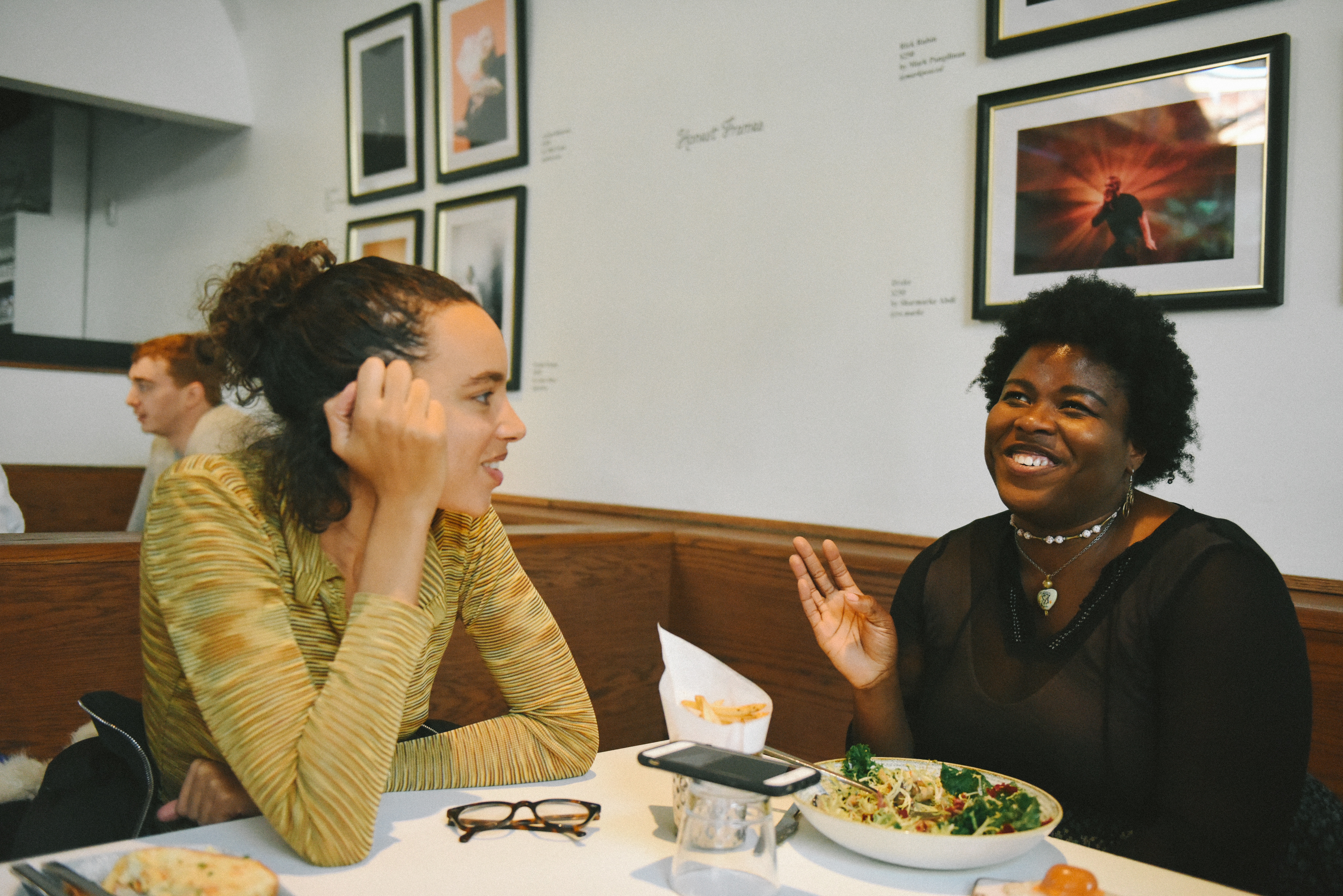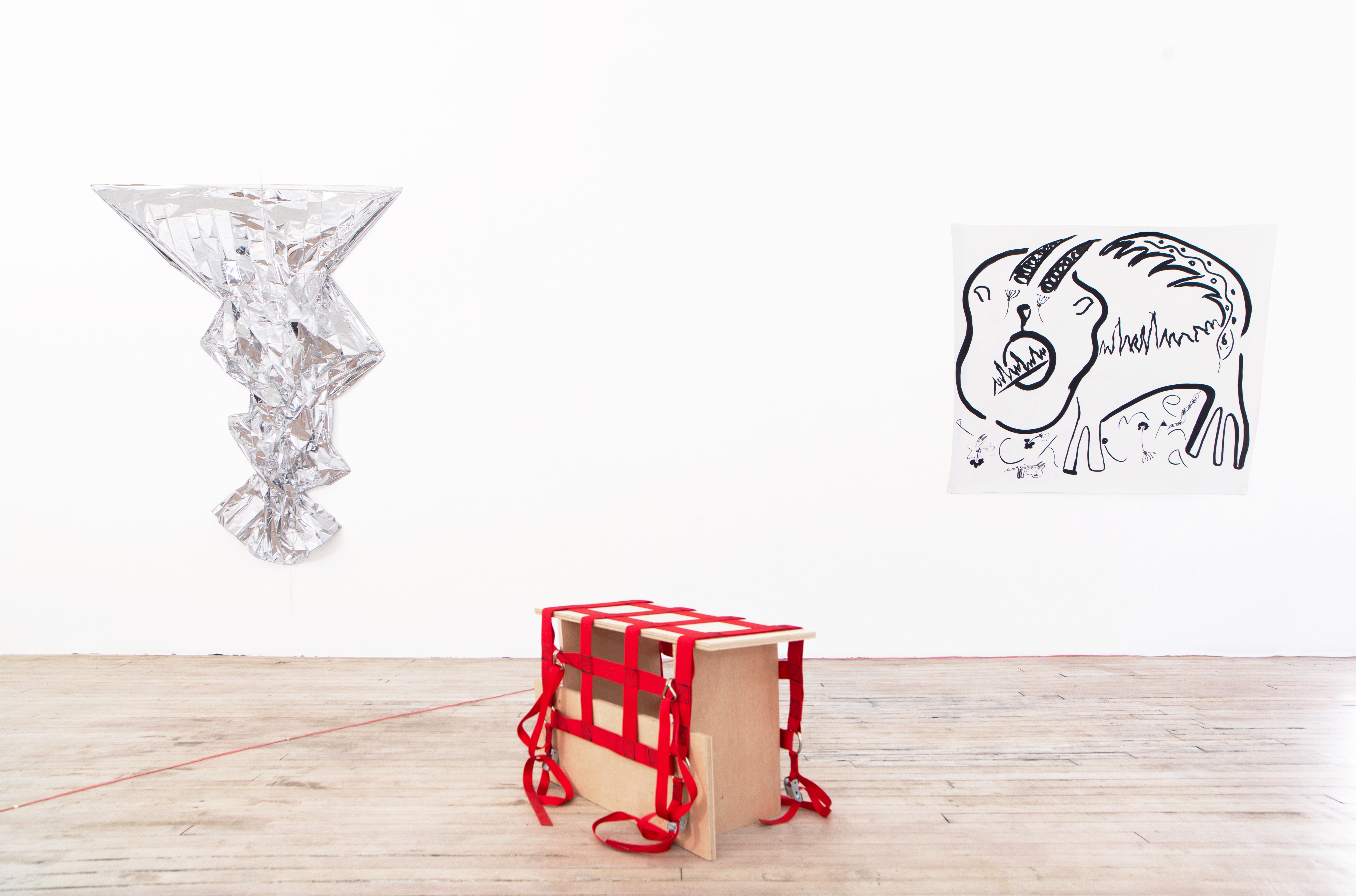“Broad Strokes” is a column celebrating creative community. We ask an artist we love to engage an artist they love in conversation about the ideas that inspire them.
Precious Okoyomon is a poet and conceptual artist living in New York, by way of Chicago, Ohio, and Nigeria, where she was born. Her most recent exhibition, I Need Help, on view last month at Real Fine Arts, was created jointly with artist Hannah Black. Featuring somewhat grotesque, woolen dolls and shreds of text, the show consume’s Black’s old work—a book of conversations between artists on The Situation, which is actually the myriad situations we find ourselves working within, like racism, capitalism, and sexism—and gestures toward something new.
Videos by VICE
Phoebe Collings-James is a Jamaican-British artist and model who spends time between New York, where she recently moved, London, where she was born, and Jamaica, where part of her family is from. For Expensive Shit, her first solo show stateside, which opened last fall at 315 Gallery, she created a tapestry of sound to capture the essence of this movement as place. In the press release, she called it a “diasporic fantasy,” or a space that “lurks somewhere between the bricks and the sky I have known—and the other that I have longed for—like some sort of sad twisted romance.”

Phoebe and Precious are friends. I met both artists for the first time at 315 Gallery in Bed Stuy for a reading curated alongside Phoebe’s solo show, which we were all participating in. It quickly became clear that the two women were incredibly open, interesting, and committed to creating vital work. Their art asks questions like: How can I heal my trauma as a black immigrant woman in America? How do I resist commodification? How do I experience a sense of home and place? Violent, colonialist capitalism sucks, huh? I liked these questions, so I asked them to come up with more over lunch.
This conversation has been edited and condensed.
Phoebe Collings-James: I haven’t seen your sculptures yet. Can you describe them?
Precious Okoyomon: For the Real Fine Arts show, Hannah [Black] and I decided to deconstruct her work from the Chisendale [Gallery] show. She made these books called The Situation [for that show], so our show was kind of the ending of it—”the situation” dying. The books are shredded and they’re thrown all over the gallery. I made these giant balls of earth. They’re clay and wool—and the wool kind of looks like my hair. It’s very thick. It’s sheep hair. You’re supposed to process the wool after you shear the sheep, but I didn’t really do that. I just got a bunch of really dirty sheep wool that has like, blood in it and dirt and I took the wool and I wrapped it around the ball then I put the shreds in there and compost.

I also made these raw wool dolls—they’re kind of like Voodoo dolls. They’re made with chunks of raw wool with raw thread that I wove and wrapped around the dolls. They’re making different poses. Some of them are in a lot of pain. They’re kind of like, melting into ground. The dolls have the shreds in them and dirt, so it’s kind of like “the situation” is inside of them. It’s like, everything has kind of exploded and gone to shit, but it’s inside of you and you can’t get out of it.
Collings-James: Wow. Oh my god.
Okoyomon: [Laughs]
BROADLY: Can you talk about what The Situation originally was?
Okoyomon: Yeah, it’s a book of conversations between artists about “the situation” we’re in. There’s multiple situations. But the actual “situation” is blacked out so you don’t really know what it is. You get a feeling that it’s something really bad.

Collings-James: Reading the book, what becomes apparent is a sense of miscommunication and a purposeful lack of understanding. It’s not just like, “Oh, I don’t understand your position.” It’s a real intentional block. It’s like, “I don’t want to understand.” It’s funny that you talk about the layering in your sculptures. I often think about the situations that were in the book and the situations as they are, constantly, in real life. More energy is put into them—more words are put in—but quite often there’s no point.
Okoyomon: Yeah, the show [at Real Fine Arts] was kind of the eruption of that.
Collings-James: Did you also make… cakes?
Okoyomon: Oh, I made a cake for the opening. It had bees and dirt—Georgian white sand—on top of it. At the end of the year, I guess around this time, all the female bees start killing the male bees because they become useless. in the hive. The female bees decapitate them and then they throw their bodies out of the hive. It’s so brutal. [Laughs.] I was going around [my girlfriend’s farm] picking up all these dead male bees. They deserve it! All they do is impregnate the queen and after that they don’t do anything for the hive except eat honey. It’s like, you’re completely useless now. Time to die.

Okoyomon: I really liked your show at 315. What inspired that?
Collings-James: Going back to Jamaica and thinking about Jamaica. I’ve only been like, three times in total, over three consecutive years up until now. The last time I went I met my great aunt and I went to her house. It was so blissful. She’s a teacher and she had lots of art that she had made in the house. We sat in her front porch with one of her friends and my other great aunt and it was just like this moment of—I don’t know—our body language being really similar, being connected. We were laughing and gossiping.
I had recorded the conversation and I wanted to do something with it. I’d been thinking a lot about the fact that I have a side of my family who are from Jamaica and a side who are from East London, who are very Cockney. Both sides have a strong identity that I feel are quite similar in a lot of ways, in attitude. The accents are quite similar—I think they can seem to other people to be quite aggressive and rowdy. I started thinking about [this project] as a research-type thing, but then I realized it wasn’t really interesting to me to look at, in this dry way, the connections of why and how these two groups of people were similar. So I went back and explored those thoughts, but as feelings. I made this sound work and it just sort of came together. It ended up being moody and quite restless—in terms of thinking about “home.”

Okoyomon: It felt kind of magical to me. When I saw it I was the only one in there. There’s the sheet on the wall that was billowing. I really like that. And I like the material—what is that?
Collings-James: That’s Mylar. I was thinking a lot about that because it’s used mostly as a relief blanket. It’s used for moments of crisis. I liked how beautiful it was, and how mesmerizing it felt to watch it while surrounded by the sound. But it also has this poignance. When I’m in Jamaica the things the that strike me as the most beautiful are textures and materials—even the dirt and things like tarpaulin—that are signs of distress. They’re not actually positive things, but when the sun hits them in the right way everything is kind of beautiful. [I’ve been thinking about] what that is and where the fetish is in that, you know?

BROADLY: Precious, earlier you brought up being born in Nigeria. Do you feel like being an immigrant influences your work?
I think a lot of my work—at least my poetry right now—is trying to understand where that places me, as a first generation immigrant child. I’m trying to find my tongue in that. It’s like, I’m trying to assimilate into this western world but I also have a culture that I come from. I’m trying to figure out where I fit in all that.
BROADLY: Do you feel like you have a distinct sense of home?
I’m a little unsure sometimes because I come from so many different places. Both of my parents are Nigerian but I can’t imagine my mom moving back to Nigeria anytime soon. My dad lives there now, but my mom is kind of like, “I’m American now.” I don’t think I’m really fully American, but I like the idea… but not really. I’ve been trying to struggle with where is this idea of home for me. I like to imagine that it’s wherever my mother is. Do you feel like you have that problem, Phoebe?
Collings-James: Yeah, I guess that’s what my show was about—locating home between these two islands, now three, living here. A lot of the music and sounds in the show were recorded while I was in transit, except for the live singing that was in it. You hear the sounds, and the car wheels, and the honks, and conversation. There’s something about that—this feeling of constantly being in transit. I was working through that feeling—of not feeling rooted. I’ve been thinking about how an identity bound to where you’re from is spoken about a lot. It’s interesting because so much of my thinking around blackness has developed here in America. (Thinking, as opposed to the emotional knowledge that has always been there.) But I’m not a black American. I’m not American. Stuart Hall talks about this idea of “identity as becoming” and at first I was quite intrigued by that idea. But now I’m like, no, I’m not becoming. I’m just here, being. I don’t know.
I’ve been feeling quite homesick recently and I want to be closer to my mom and sister and dad. I’ve been thinking of what that means, in terms of home. I don’t feel tied to London as a place. It’s miserable. But anywhere where we are together is what matters. It’s not quite about location.

Okoyomon: It’s interesting to me because I am a black American—I do identify with that—and when I go to Nigeria all my cousins are like, “Oh, you’ve gone abroad now. You’re not a Nigerian. You don’t have the same identity as me anymore.” They call it Ajebota. They’re like, “She can’t eat goat head. It will hurt her.” [Laughs.]
Collings-James: But you’re like, I don’t actually want to eat goat head. [Laughs.] But it doesn’t mean anything!
BROADLY: As black women artists, do you feel like your work is treated differently? I’m thinking about how a lot of art spaces are really white and the dynamics of exhibiting art about black identity for white audiences.
Collings-James: I think it’s a confusing time because our artistry is now peak commodity. We’re evolving new commodity positions. The racism isn’t in the forms that you might have expected previously. I also don’t spend that much time with white people and their ideas about my work. All the weird shit they’re probably thinking about, I guard myself against it. I feel protective of myself and other people.
For More Stories Like This, Sign Up for Our Newsletter
Okoyomon: I’m coming from a place where people who are drawn to my work have a similar experience. But at the same time, a lot of my work is about being a black woman… I’m not saying it’s only for black women, but sometimes it is.
More
From VICE
-

Lectric Ebikes -

Collage by VICE -

Screenshot: Epic Games -

Saatva
